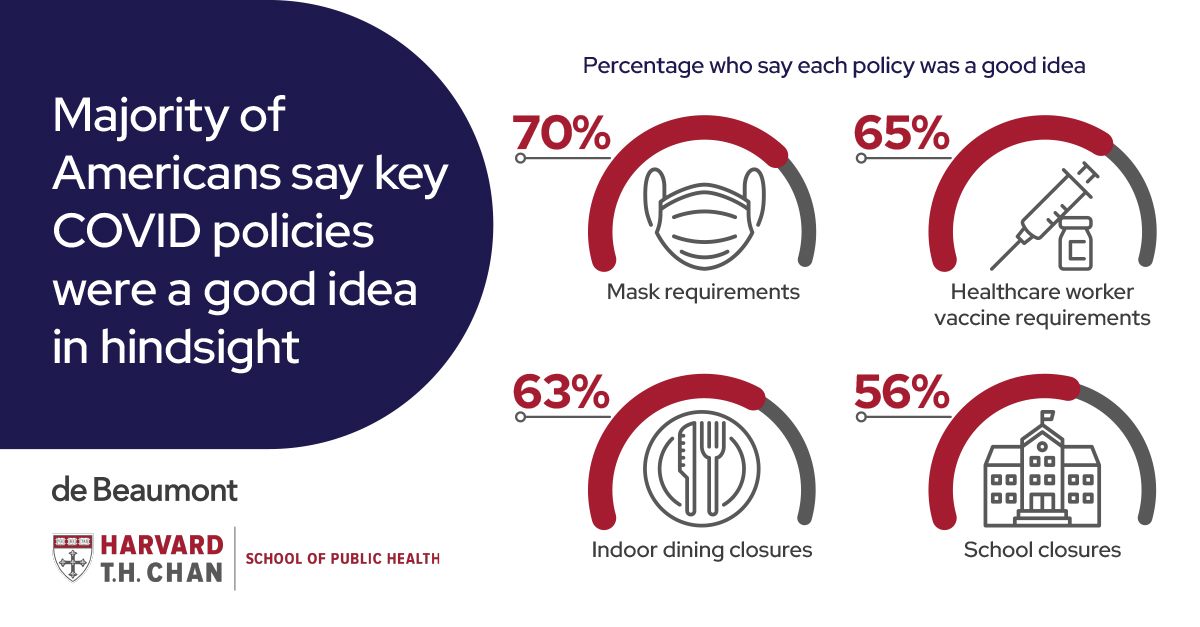
The majority of Americans think key COVID-19 policies were a good idea, though views of individual policies vary. (Source: U.S. Views on Pandemic Policies: Lessons for Emerging Outbreaks, Harvard T.H. Chan School of Public Health and the de Beaumont Foundation.)
The public health toolbox of pandemic mitigation measures may not be closed as many people might assume, according to findings from a new national poll by Harvard T.H. Chan School of Public Health and the de Beaumont Foundation. Reflecting on their COVID-19 experience, the majority of respondents said they consider several key pandemic policies “generally a good idea,” though views of individual policies vary.
The percentage who said each of these policies were “generally a good idea”:
- Mask requirements in stores and businesses – 70%
- Healthcare worker vaccine requirements – 65%
- Indoor dining closures – 63%
- K-12 public school closures – 56%
Forty-two percent said they think all four policies were a good idea, 37% said some were a good idea, and only 20% said the policies were all “generally a bad idea.”
Brian C. Castrucci, DrPH, de Beaumont President and CEO, said, “Public health professionals need to know that these vital protections are still available in their toolboxes. Understanding what drives resistance for some people can help inform the best ways to use and communicate about these policies should we need to call on them in the future.”
These results suggest more receptivity and nuance in views of pandemic policies than one may expect, given widely reported resistance and polarization. Respondents gave both practical and principled reasons for disliking the policies. Among those who say the policies were a bad idea, top reasons include:
- Belief that policies went on too long (84–87% across policies)
- Concerns about political motivations behind policy decisions (60–81%)
- Concerns about effects on the economy (68–91%)
- Perceived lack of personal choice (75–94%)
Among those who say school closures were generally a bad idea, nearly all say major reasons include perceived negative effects on children’s learning (97%) and mental health (91%).
Views vary by demographics and political affiliation
Views on these pandemic policies vary by subgroup characteristics, including political party affiliation, race, ethnicity, and metropolitan status. The percentage who said all four policies were generally a good idea:
Political affiliation:
- Democrats – 71%
- Independents – 44%
- Republicans – 18%
Race/ethnicity:
- Black adults – 62%
- Hispanic/Latino adults – 55%
- White adults – 32%
Metropolitan status:
- People living in urban areas – 55%
- Suburban areas – 39%
- Rural areas – 29%
Notably, all subgroups were receptive to the policies, with majorities of each saying at least one of the four policies was a good idea in hindsight.
“In order for all Americans to benefit from public health protections in outbreaks, leaders need to see there are opportunities to build on public receptivity even where it is limited, and understand where people’s concerns come from,” said Gillian K. SteelFisher, PhD, director of the survey, Director of Global Polling in the Harvard Opinion Research Program, and Principal Research Scientist at Harvard T.H. Chan School of Public Health. “These data suggest that keeping outbreak response policies focused on the most at-risk populations, using and communicating clear and limited time frames, and considering the broader economic and societal impacts of policies could go a long way to maintaining public support in the next outbreak and beyond.”
Differing beliefs about the severity of the initial COVID-19 threat
Additional findings show that Americans have differing beliefs about how severe the threat of COVID-19 was early on in the pandemic. Among respondents, there were very few total COVID-deniers, with only 3% saying COVID-19 was not a health threat to anyone early in the pandemic.
Only 37% of respondents said they believe COVID-19 was a serious health threat to everyone early on. Fourteen percent said it was a serious health threat only to very old or frail people, and 45% said it was a serious health threat to older people and those with underlying medical conditions. Respondents who considered the pandemic a widespread threat early on were more likely to consider the pandemic policies a good idea.
View the complete poll findings.
The poll, U.S. Views on Pandemic Policies: Lessons for Emerging Outbreaks, was conducted by Harvard T.H. Chan School of Public Health and the de Beaumont Foundation March 21 to April 2, 2024, among a nationally representative, probability-based sample of 1,017 adults ages 18 or older. The margin of error at the 95% confidence interval is +/- 4.1 percentage points.




